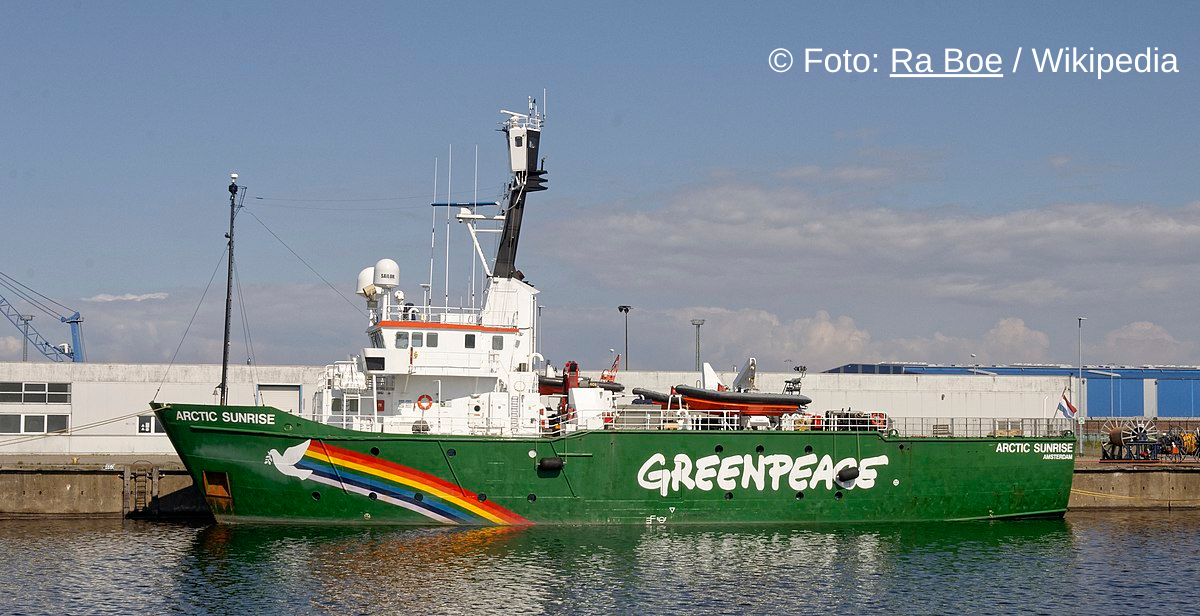The European Court of Human Rights (ECtHR) has today issued its decision in the case of Bryan and others v. Russia. The ECtHR found that Russia had violated the applicants’ rights to freedom of expression and to liberty and security by arresting and detaining them following the protest organised by Greenpeace activists on its Arctic Sunrise vessel. The applicants in the case included two journalists who were covering the protest.
The case
In September 2013, the ‘Arctic 30’, comprising 28 Greenpeace activists and two journalists, travelled the Barents Sea aboard the Arctic Sunrise. The aim of the journey was to protest a new oil-drilling platform, owned and operated by the Russian company Gazprom. Having informed Gazprom and the Russian Coast Guard of their plans to demonstrate peacefully, activists made their way to the platform and attempted to affix to it a protest banner. Russian state agents immediately arrested and detained the two activists with the banner and ordered Arctic Sunrise to allow their investigation team on board. When the Arctic Sunrise refused, armed agents of the Russian Federal Security Service successfully boarded the vessel from a helicopter.
Following the Russian boarding of the Arctic Sunrise, the activists and journalists on board the vessel were arrested and detained. The facts of this case are a paradigm example of the harassment and threats faced by environmental activists and journalists reporting on environmental issues in Russia, including through the use of Russian laws on ‘hooliganism.’
The applicants in Bryan and others v. Russia all complained that their right to freedom of expression had been violated. The journalists emphasised that their arrest and detention amounted to a violation of their right to collect and disseminate information about the protest. The local courts refused to recognise the unique role of the journalists, who were present in order to cover the protest.
Our intervention
We intervened in this case alongside Article19. Our intervention argued that preventing the media from newsgathering and holding government authorities to account at protests amounts to a serious interference with the right to freedom of expression. The intervention then questioned the extent to which journalists can be treated the same as those they are observing at demonstrations. In light of this, it highlighted the importance of ensuring that increased protections are available to journalists in such circumstances.
Our intervention also challenged the narrow definition of ‘journalist’ used in the domestic proceedings, which refused to recognise one of the journalists on board as such because he “had no employment contract with any foreign publisher and was not accredited as a journalist on the territory of Russia”. We argued that a wide range of actors, beyond those with official accreditation, perform journalistic functions and must be afforded protections.
Noting the essential ‘public watchdog’ role the press plays, the intervention then emphasised that sanctions against journalists must be subject to the strictest scrutiny. Finally, it addressed the ‘chilling effect’ the imposition of sanctions on journalists covering protests and demonstrations can have.
The judgment
On 27 June 2023, the ECtHR published its decision in Bryan and others v. Russia. The Court ruled unanimously that the detention of the ‘Arctic 30’ was arbitrary and amounted to an interference with their freedom of expression. It acknowledged our intervention in its decision, citing our evidence of the systematic harassment of journalists covering environmental matters in Russia.
The intervention can be found here.
Recent News
World Press Freedom Day Side Event: Profiling and surveillance, a renewed challenge to freedom of expression
From May 2-4 2024, UNESCO and the government of Chile will host the 31st edition of World Press Freedom Day in Santiago. The global commemorative conference commemorates the vital role of journalism and information access in fostering a sustainable future that upholds diversity of voices. Media Defence is organising a side event at the conference […]
Landmark Ruling: Kenya’s High Court Declares Colonial-era Subversion Laws Unconstitutional
Media Defence welcomes the verdict of the High Court in Nakuru, striking down sections of the Kenyan Penal Code which criminalise subversion, citing them as relics of colonial oppression that curtail freedom of expression. Justice Samwel Mohochi, delivering the judgment, asserted that these provisions were overly broad and vague, stifling dissent rather than serving any […]
UN Rapporteurs Call for Protection of Brazilian Journalist Schirlei Alves
UN Rapporteurs Call for Protection of Brazilian Journalist Schirlei Alves Amid Defamation Charges Stemming from Rape Trial Coverage A letter dispatched by UN rapporteurs to the Brazilian Government calls for protective measures for women journalists covering cases of sexual crimes. The letter also denounces the conviction of Brazilian investigative journalist and women’s rights defender, Schirlei […]



